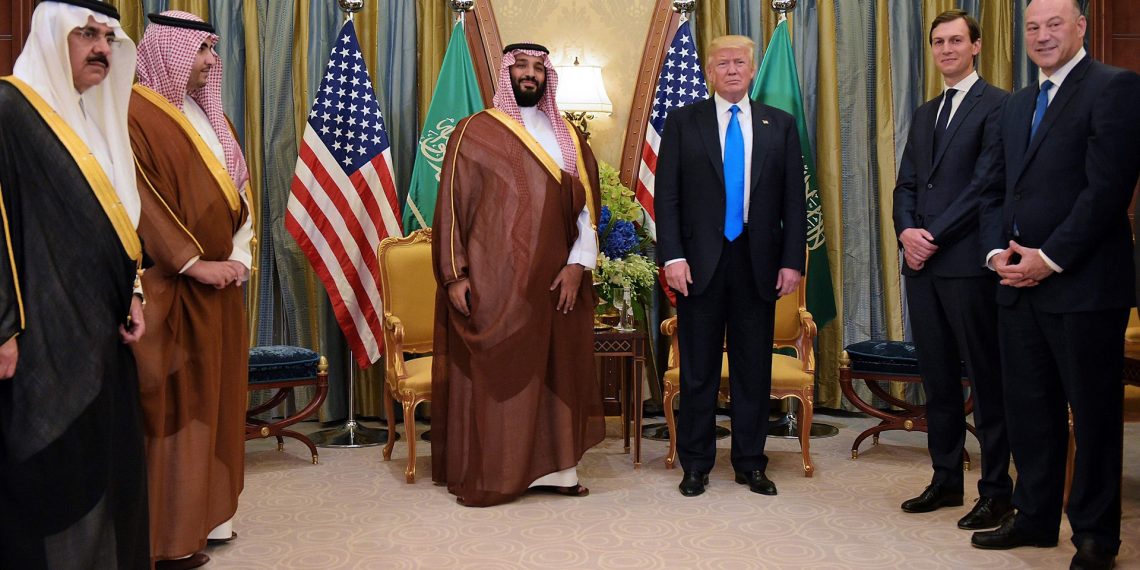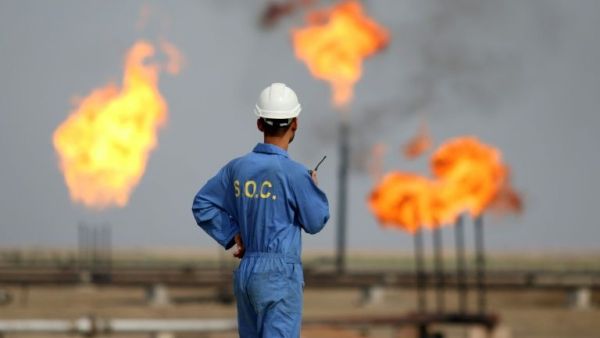While COVID-19 continues to wreak havoc throughout the world, the ongoing oil price war initiated by Saudi Arabia is threatening to compound the ongoing economic volatility into a full-blown catastrophe.
It could also cause rippling political effects, sewing tension between the Trump Administration and Saudi’s de facto ruler, Mohammed bin Salman.
For the first time in history, oil futures dropped below $0 per barrel, indicating that the cost of storing oil is now more than the oil itself is worth on the market. According to the New York Times, some oil traders had to buy to offload their oil stores.
One Saudi oil industry source told Reuters that Aramco is now asking its partner service companies to help raise its oil productive capacity to 12 million barrels per day (bpd) “for the foreseeable future,” and suggested the company plans to raise it further to 13 million bpd.
For the first time in history, oil futures dropped below $0 per barrel, indicating that the cost of storing oil is now more than the oil itself is worth on the market.
Saudi began its oil price war with Russia just before the COVID-19 virus outbreak became a global pandemic. Seeking increased market share, Saudi began substantially increasing its oil production, which drove prices down. By late March, it had become clear the combined effects of the historic drop in demand plus Saudi’s willingness to continue pumping cheap oil could cause major international oil companies and oil-reliant economies to sink into debt.
ExxonMobil’s credit rating has been downgraded, as have Mexico’s state-owned oil firm Pemex and the state of Alaska, which relies heavily on oil revenue.
As the oil price war drags on, Trump is likely to face increased domestic pressure to try and halt Saudi’s aggressive economic maneuvers. If there is anything that can shake Mohammed bin Salman’s grip on the throne, it is by sabotaging Saudi’s primary economic lifeline: the profitability of oil.
A Quick Explanation of the Oil Price War

Mohammed bin Salman (right) with Vladimir Putin (left) (AFP/FILE)
The three biggest producers of oil in the world is Saudi, Russia and the U.S. For years, Russia and Saudi jockeyed to be the world’s top oil producer, but U.S. shale oil has recently begun diluting the other countries’ market shares.
Broadly speaking, each country carefully monitors how much oil it produces compared to the others, and any major plan to raise or lower the rate of daily oil production is the subject of intense negotiations.
For much of the 21st century, Aramco has remained a giant of oil production, boasting some of the lowest breakeven costs. In 2019, the state oil company calculated that it could sell its oil at $10 per barrel and still record a profit, compared to $20 for the UAE, and $40 for Russia. U.S. shale oil’s breakeven price is about $50.
Last year, oil prices began to plummet due to the trade war between the U.S. and China. But the average price per barrel hovered around $60 and looked to be in relatively stable shape. A few months into 2020, that number looks to be zero.
In 2019, the state oil company calculated that it could sell its oil at $10 per barrel and still record a profit, compared to $20 for the UAE, and $40 for Russia. U.S. shale oil’s breakeven price is about $50.
In early March, Saudi attempted to negotiate a global reduction in oil production with Russia, which failed.
“This deal made no sense from the standpoint of Russian interests,” Igor Sechin, an close ally of Putin said at the time, referring to the possibility that cuts in Saudi and Russian oil flows could give the U.S. a greater global market share. “By removing cheap Arab and Russian oil from our own markets, we open up the way for expensive American shale oil,” he added.
In response, Saudi initiated the oil price war by ramping up production, which lowered the global price of oil even further. When demand for oil fell globally, the price decreased even further. For its part, Russia has officially stood steadfast: the Ministry of Finance even claimed that Russia could remain afloat selling its oil at $25 per barrel for 10 years.
"I think that Russia and Saudi Arabia, at some point, are going to make a deal in the not-too-distant future because it's very bad for Russia. It's very bad for Saudi Arabia," Trump said of the war in early April.
“By removing cheap Arab and Russian oil from our own markets, we open up the way for expensive American shale oil.”
Despite this, the oil price war continues on, with neither Russia nor Saudi demonstrating that it will budge from their respective positions.
For oil companies and oil-dependent countries, that means their main source of income is not only worthless, but it could also be a major financial liability that could cost them money to store or sell.
On top of firms and states have their credit ratings downgraded, Norway, Mexico and Canada’s currencies are currently losing value, which has given the U.S. dollar a temporary boost as risk-averse investors flock towards it. Venezuela's political instability has spiraled further, and Nigeria, Turkey, and Iran are also likely to experience further volatility to their already-hampered markets.
Because Russia and Saudi both rely so heavily on oil for state revenue, the longer the oil price war continues, the more likely it will be their debt will accumulate to stifle their own economies.
For the U.S.’ part, Trump is reportedly considering a move to stem the tidal flow of Saudi oil by announcing a temporary ban on the import of Saudi crude oil, but that is likely to have only a small impact.
The Potential Political Fallout Between MbS and Trump

Trump with Mohammed bin Salman in Riyadh, May 2017 (AFP/FILE)
With demand forecasted to remain low as the world continues to abide by quarantine measures limiting travel, Saudi’s oil price gambit could backfire spectacularly.
Though the situation remains volatile and predictions are ill-advised, if the oil price war rages, Trump will face increasing pressure to negotiate with Saudi to lower production rapidly. Local governments in oil-rich states like Texas, California, Oklahoma and Alaska could begin petitioning Trump’s cabinet to engage the Saudis. Trump has already fielded meetings with executives of U.S. oil companies fearful of marking the fiscal year of 2020 as one defined by losses and debt accumulation.
Trade and military agreements, including a sensitive nuclear technology sharing arrangement, could be on the table in a bid to leverage a deal with Saudi’s crown prince Mohammed bin Salman.
Because U.S. shale oil is so expensive to extract, a fall in prices as drastic as the current one has immediately pushed shale-based companies towards bankruptcy. A cascade of oil and service companies declaration bankruptcy could deepen and prolong COVID-19-related economic impacts.
Politically speaking, the Trump team faces the prospect of being blamed for the obliteration of U.S. oil markets if he cannot find a way to stop Saudi before the general election. Even if production rates level off in the next few months, the lingering effects could put U.S. oil companies in the red, meaning Trump would have to navigate through a stagnated economy in a bid to keep the White House.
Various trade and military agreements, including a sensitive nuclear technology sharing arrangement, could be on the table in a bid to leverage a deal with Saudi’s crown prince Mohammed bin Salman (MbS).
A failed oil price war would threaten all three of those plans simultaneously, which would pose the biggest challenge to his ascension yet.
Meanwhile, MbS is likely to face a growing chorus of dissent inside his regime if the lowered oil price wars digs the country deeper into debt.
Thus far, MbS has weathered a number of political storms including the murder of Washington Post journalist Jamal Khashoggi and the ongoing war in Yemen, which he has helped to orchestrate.
Part of the reason to account for MbS’ unparalleled rise to power in Saudi was his promise of diversifying his economy beyond oil, restructuring the public sector to be less costly, and opening the way to forign investment via his broad Saudi Vision 2030 plan.
A failed oil price war would threaten all three of those plans simultaneously, which would pose the biggest challenge to his ascension yet.
The views expressed in this article do not necessarily reflect those of Al Bawaba News.







